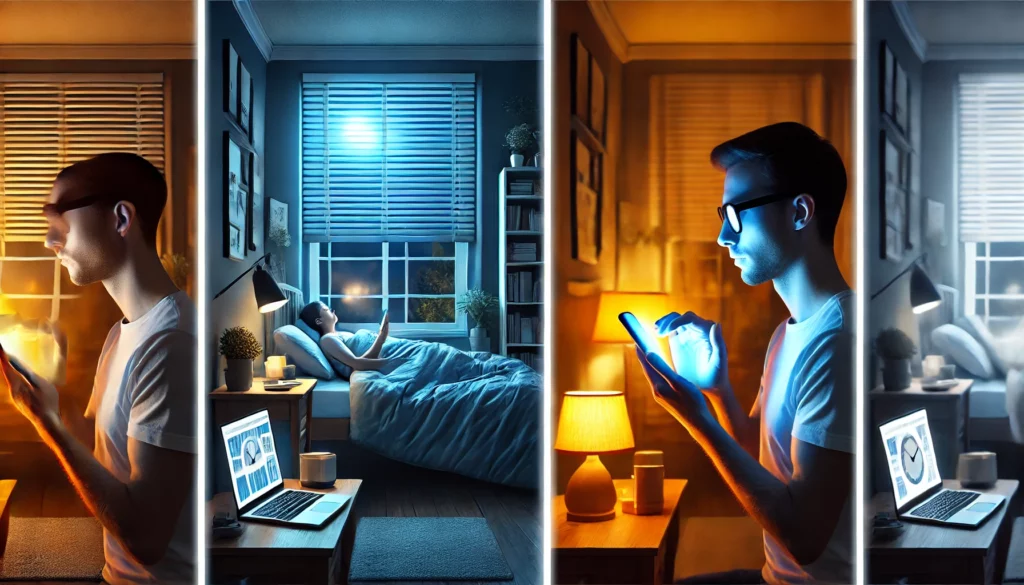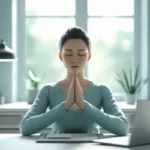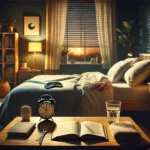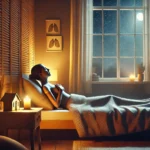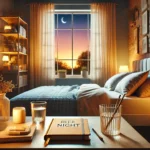In a world filled with screens—smartphones, laptops, televisions, and tablets—blue light exposure has become almost constant. While technology has made life more convenient, it can also disrupt one of the most important foundations of health: sleep.
If you find it hard to fall asleep, stay asleep, or wake up feeling truly rested, blue light may be interfering with your natural sleep cycle. The good news is that once you understand how blue light affects your body, there are practical steps you can take to reduce its impact and improve the quality of your rest.
What Is Blue Light and Where Does It Come From?
Blue light is a type of high-energy visible light with short wavelengths. In nature, it plays an important role in helping regulate your internal body clock, known as the circadian rhythm. During the day, blue light—especially from sunlight—helps keep you alert and awake.
The problem arises when you’re exposed to artificial sources of blue light during the evening. These sources include smartphones, tablets, laptops, TVs, LED lights, and even household lighting. When you take in this type of light at night, your brain can mistakenly interpret it as daylight, disrupting your natural rhythm and delaying the production of melatonin—the hormone responsible for sleep.
While blue light exposure is beneficial during the day, too much of it at night can prevent your body from winding down.
How Blue Light Disrupts Sleep
Melatonin is a hormone that signals to your body that it’s time to sleep. When blue light blocks or delays melatonin production, your body struggles to relax, fall asleep, and stay in deep, restorative sleep stages.
Here are a few common effects of nighttime blue light exposure:
- It delays the time it takes to fall asleep, often pushing bedtime later.
- It reduces the quality of sleep, leading to lighter and more fragmented rest.
- It increases the chances of waking up during the night.
- It makes mornings feel more difficult, often causing grogginess or brain fog.
Some studies show that screen use before bed can suppress melatonin levels by up to 85%, delaying sleep by as much as an hour.
How to Reduce Blue Light Exposure and Improve Sleep
Making small adjustments to your evening routine can have a big impact on how well you sleep. Here are several practical strategies you can start using today.
Avoid Screens at Least One Hour Before Bed
Giving your brain time to relax without screen exposure signals to your body that it’s time to sleep. Try reading a book, writing in a journal, or simply enjoying a quiet moment before bed. Replacing digital time with calm, screen-free activities can help reset your body’s natural rhythm.
Use Blue Light Filters on Devices
If you must use devices in the evening, use the built-in blue light filters available on most smartphones, computers, and tablets. These settings—like Night Shift (iOS) or Night Light (Windows and Android)—adjust the color temperature of your screen to warmer tones that are less disruptive to sleep.
Apps like f.lux or Iris can also help automatically adjust lighting based on the time of day, offering extra support for late-night work sessions.
Try Blue Light Blocking Glasses
These glasses filter out the wavelengths of blue light that interfere with melatonin. They can be especially useful if you work or study late into the evening and can’t avoid screens altogether.
Look for glasses with amber or red-tinted lenses and make sure they’re rated to block a high percentage of blue light. Wearing them two to three hours before bedtime can help your brain prepare for sleep even if screens are part of your evening.
Dim the Lights at Night
Overhead LED and fluorescent lighting can also disrupt your circadian rhythm. Creating a softer, warmer lighting environment in the evening helps your body shift into a relaxed state.
Switch to dim lighting with warm yellow or orange hues in the last hour before bed. Table lamps, candles, or dimmable bulbs can help create a calming atmosphere that naturally supports melatonin production.
Get Sunlight Exposure in the Morning
While reducing blue light at night is important, exposing yourself to natural light in the morning also helps regulate your sleep-wake cycle. Bright light during the early part of the day reinforces your body’s internal clock, making it easier to fall asleep at night.
Spend at least 10 to 15 minutes outdoors in the morning, or open your blinds to let sunlight into your space. This daily rhythm of morning light and evening darkness can significantly improve sleep quality over time.
Create a Blue Light-Free Bedtime Routine
Rather than relying on screens as part of your wind-down process, develop a routine that’s calming and screen-free. Activities like stretching, meditating, taking a warm shower, or drinking herbal tea can ease your transition into sleep.
This helps reinforce a habit where your brain associates certain non-stimulating activities with rest. Over time, it becomes easier to fall asleep quickly and stay asleep throughout the night.
Eliminate Light in Your Bedroom
Even small sources of light—like a blinking router, charging cables, or a TV standby light—can interfere with your ability to stay in deep sleep. Keeping your room as dark as possible helps signal to your brain that it’s time to fully rest.
Use blackout curtains, turn off unnecessary electronics, and cover any glowing lights with tape if needed. If complete darkness isn’t possible, wearing a comfortable sleep mask can also help.
Making These Habits Stick
If cutting out all blue light at night feels overwhelming, start small. Begin by turning off screens just 30 minutes before bed and gradually increase that window. Replace one habit—like scrolling on your phone—with another, such as reading or meditating.
Stick to a consistent sleep schedule and try to follow your routine even on weekends. Tracking your sleep with a journal or app can also help you notice patterns and improvements as you make changes.
Prioritize Sleep to Improve Your Days
The quality of your sleep has a direct effect on how you feel, think, and perform during the day. Reducing blue light exposure in the evening is one of the simplest and most effective ways to improve your rest and reset your internal clock.
By creating an environment that supports your body’s natural rhythm, you can fall asleep faster, sleep deeper, and wake up feeling truly rested—without needing more hours in bed.
Start tonight by turning off your screens one hour before bedtime and paying attention to how your sleep responds. A few intentional changes can make a noticeable difference in your energy, focus, and well-being.
Gabriel Silva is the founder of Cursos e Soluções, a blog dedicated to personal growth, habit change, and self-discipline. Passionate about self-development and productivity, he shares practical, research-backed strategies to help people achieve their goals. He believes that small, consistent changes can lead to significant transformations over time and is committed to providing content that empowers both personal and professional success.

